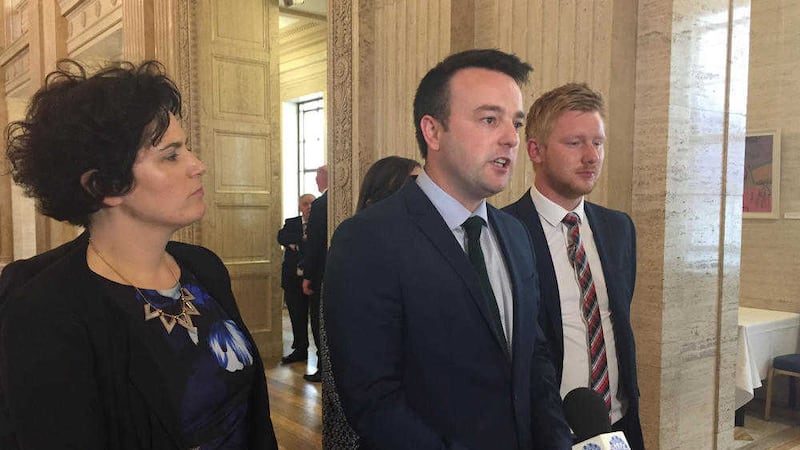ATTENTION has not surprisingly been drawn to one particularly interesting aspect of the assembly election results, namely the fall in the combined nationalist vote from 42 per cent in the 2011 Stormont poll through to 38.4 per cent in the Westminster election a year ago to just 36 per cent last week.
There is one factor that both nationalist parties would prefer was overlooked in any analysis of this trend.
And that is the uncomfortable truth that the DUP best represents the views of a not insignificant number of Catholics on important moral issues such as abortion and the redefinition of marriage.
I drew attention to this possibility in a column after the referendum redefining marriage in the Republic almost a year ago.
In the absence of firm research, it is hard to quantify the disaffection of Catholics over these matters but it is reasonable to assume that some erstwhile SDLP and (to a lesser extent) Sinn Féin voters just stayed at home.
And some others have actually voted for the DUP, probably a small number but any such change in voting behaviour is both noteworthy and significant.
If the establishment of justice and equality for Catholics under the Good Friday Agreement makes the constitutional issue recede, further cross-voting becomes more likely.
Colum Eastwood’s tardiness in describing the SDLP as a Pro-Life party and the failure to insert a Pro-Life stance in their manifesto would have been noted by those concerned electors as would have been his party’s pledge to support the redefinition of marriage and their backing for integrated education in the new mandate.
That drop in nationalist support is significant because it suggests that the union with Britain is arguably more secure than ever before and it undermines the case that has been made fairly regularly by Sinn Féin for a referendum on Irish unity under the terms of the Good Friday Agreement.
Mind you it is often forgotten that the nineteenth amendment to the Irish Constitution that followed the Good Friday Agreement makes it clear that a united Ireland requires majorities in both jurisdictions on the island so at some future date a majority in the north could conceivably vote for unity and be rebuffed by the Republic.
The fall in the nationalist vote allied to the results of previous opinion polls and Northern Ireland Life & Times Surveys of recent years suggest unity is far from being a priority for nationalists here and adds weight to Mr Eastwood’s argument since his election as leader that the priority has to be to make Northern Ireland work before reunification can be achieved.
However, a UK exit from the EU in the June 23 referendum could ultimately change everything.
Brexit could not just lead to customs posts and border controls preventing the free movement of people into the UK from the EU, as Ken Clarke MP, the former Chancellor of the Exchequer warned on BBC’s “Talkback” on Monday.
It could herald a prolonged period of financial, economic and constitutional uncertainty that is not in anyone’s interests at a time when this post-conflict society needs a period of stability, prolonged healing and reconciliation along with investment and jobs.
If Scotland votes clearly to stay in the EU Brexit could trigger a new referendum resulting in Scottish independence, the breakup of the UK, and a referendum here on Irish unity in a totally new situation.
Unionists supporting Brexit should be careful what they wish for.
Back at Stormont, a triumphant Arlene Foster and her DUP have a particular responsibility to display a quality of statesmanship not seen here before in the years running up to the centenary of the unfortunate birth of Northern Ireland.
And Mike Nesbitt the UUP leader and Colum Eastwood, and their respective parties, have a huge call to make in the days ahead.
Do they accept one minister each in a DUP-SF dominated executive and make it easy for People Before Profit, the Greens and Jim Allister to become the de facto opposition?
Or do Nesbitt and Eastwood think strategically, take a bold leap of faith, magnify their relevance, and imagine the alternative they might be able to offer electors in five years’ time in 2021 - after fourteen years of DUP-SF domination - by respectively taking the brave but risky course of becoming a properly resourced official opposition?
The ancient Latin proverb penned by Terence, the Roman playwright in his Phormio more than 2,000 years ago should not be lost on Mike and Colum: Fortis fortuna adiuvat (Fortune aids the brave).
:: This column was written prior to Thursday's announcement by the UUP.








